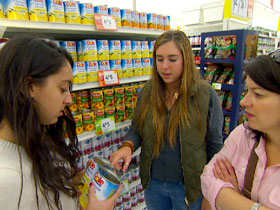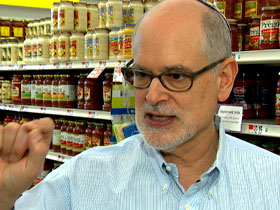In This Episode << SLIDE LEFT TO SEE ADDITIONAL SEGMENTS
Jewish Community Food Stamp Challenge
RABBI LENNY GORDON (Congregation Mishkan Tefila): I am doing the Food Stamp Challenge, and many of my colleagues are doing it during this week before Thanksgiving. And I am sure that this will inform our teaching to our communities, our community Thanksgiving events, and our Thanksgiving meals.
Starting off my own personal Food Stamp Challenge with a day with our teenagers is actually very important for me. We’re going to do a little menu planning and shopping-trip planning before we go to sort of think about what we are going to be looking for…and then to go out there and price it and try as we’re going through, creating what essentially will be for me my week’s food supply.
Coming off the book and film “The Hunger Games,” the kids came up with this idea that the theme for the year is Hunger is No Game.
 TEENS IN SUPERMARKET: $1.84; $1.50 for these. So we’re saving some money.
TEENS IN SUPERMARKET: $1.84; $1.50 for these. So we’re saving some money.
RABBI GORDON: The point is to always hold in mind that we’re trying to replicate an experience that is not a game. For a slice of people who have to choose between rent, medication, food, that you might sometimes have this as your total food budget.
TEENS AND SUPERVISOR IN SUPERMARKET: So we can put these on last, and then if we have enough for the extra second one, we will. OK.
RABBI GORDON: When you go to a supermarket, you can’t just buy whatever you want.
CASHIER AT CHECKOUT: $28.34 is your total.
RABBI GORDON: During the days of the Food Stamp Challenge, one of the things that–one of the repeated experiences is leaving a meal and not being sated. We’re gonna have a little meal together at the end of our day today, just so that we sit down together and say, “OK, this is what a meal might look like for a family to sit down together, and this is what they’d be eating.”
 For the people doing this, it’s not a hardship, it’s not a crisis. It’s something we’re doing to deepen our understanding about America. You know, there’s a story that I was told that, you know, sort of was transformative for me about a teacher in an elementary school looking at a girl who was falling asleep in class. And he said to her, “What’s wrong? Didn’t you have breakfast this morning?” And she said, “No, it wasn’t my turn.” And it was like, yeah, you know, there are people who are making decisions with multiple kids about who can have a breakfast before they go off to school. That’s what’s at stake.
For the people doing this, it’s not a hardship, it’s not a crisis. It’s something we’re doing to deepen our understanding about America. You know, there’s a story that I was told that, you know, sort of was transformative for me about a teacher in an elementary school looking at a girl who was falling asleep in class. And he said to her, “What’s wrong? Didn’t you have breakfast this morning?” And she said, “No, it wasn’t my turn.” And it was like, yeah, you know, there are people who are making decisions with multiple kids about who can have a breakfast before they go off to school. That’s what’s at stake.
Our synagogue is involved in collecting cereals and canned soups that are given as part of a food pantry. The teens who are doing the gathering of materials now, during the days and weeks ahead this year are becoming the ones who do the deliveries.
The tradition of the prophets was a tradition that said whatever you are doing is not really working as long as there are people who are hungry, who are without clothing, who are without shelter. When we talk about food insecurity, when we talk about the fact that there are people who are not sure where there next meal comes from, that’s where our vision needs to be.
The Food Stamp Challenge will culminate for me on Shabbat. And then, as the Sabbath ends, an opportunity to say, “OK, and now I can return to the normal routines of life,” but a little transformed by understanding that there are others for whom going back to normal meals is not an option.

